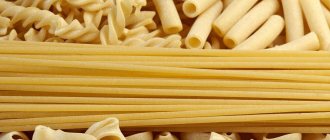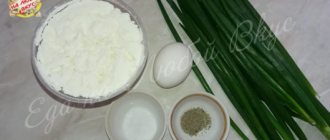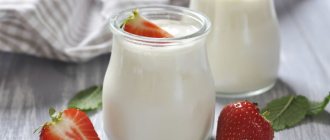Calculation of caloric content of a product per 100 grams
The calculation of the calorie content of 100 grams of product is based on previously known indicators of BZHU (abbreviation: proteins-fats-carbohydrates). The calculation method is the summation of these data (obtained by laboratory analysis and calculations) previously multiplied by a value equal to the energy released (calories) during their splitting. So, for example, 1 gram of protein or carbohydrate can release energy equal to 4.1 kcal, and fat a little more than 9. In calorie calculations, these numbers are usually rounded to whole numbers, as is the result itself.
Our example involves proteins - 25 grams and fats - 26 grams, contained in 100 grams of product. Next we perform the calculation:
Energy value of 100 grams = 25 (proteins)*4 + 26 (fat)*9 = 100 + 234 = 334 kcal
Our calculated calorie content is more than 250 kcal, which means that cream cheese is a high-calorie product with a high protein, fat and low carbohydrate content.
Calories Cream cheese Cream cheese. Chemical composition and nutritional value.
Nutritional value and chemical composition of "Cream cheese".
The table shows the nutritional content (calories, proteins, fats, carbohydrates, vitamins and minerals) per 100 grams of edible portion.
| Nutrient | Quantity | Norm** | % of the norm in 100 g | % of the norm in 100 kcal | 100% normal |
| Calorie content | 270 kcal | 1684 kcal | 16% | 5.9% | 624 g |
| Squirrels | 6 g | 76 g | 7.9% | 2.9% | 1267 g |
| Fats | 26 g | 56 g | 46.4% | 17.2% | 215 g |
| Carbohydrates | 3 g | 219 g | 1.4% | 0.5% | 7300 g |
| Water | 52.62 g | 2273 g | 2.3% | 0.9% | 4320 g |
| Ash | 1.27 g | ~ | |||
| Vitamins | |||||
| Vitamin A, RE | 308 mcg | 900 mcg | 34.2% | 12.7% | 292 g |
| Retinol | 0.303 mg | ~ | |||
| alpha carotene | 1 mcg | ~ | |||
| beta carotene | 0.059 mg | 5 mg | 1.2% | 0.4% | 8475 g |
| beta Cryptoxanthin | 2 mcg | ~ | |||
| Lutein + Zeaxanthin | 7 mcg | ~ | |||
| Vitamin B1, thiamine | 0.023 mg | 1.5 mg | 1.5% | 0.6% | 6522 g |
| Vitamin B2, riboflavin | 0.23 mg | 1.8 mg | 12.8% | 4.7% | 783 g |
| Vitamin B4, choline | 26.8 mg | 500 mg | 5.4% | 2% | 1866 |
| Vitamin B5, pantothenic | 0.517 mg | 5 mg | 10.3% | 3.8% | 967 g |
| Vitamin B6, pyridoxine | 0.056 mg | 2 mg | 2.8% | 1% | 3571 g |
| Vitamin B9, folates | 9 mcg | 400 mcg | 2.3% | 0.9% | 4444 g |
| Vitamin B12, cobalamin | 0.22 mcg | 3 mcg | 7.3% | 2.7% | 1364 g |
| Vitamin E, alpha tocopherol, TE | 0.86 mg | 15 mg | 5.7% | 2.1% | 1744 g |
| gamma tocopherol | 0.41 mg | ~ | |||
| Vitamin K, phylloquinone | 2.1 mcg | 120 mcg | 1.8% | 0.7% | 5714 g |
| Vitamin RR, NE | 0.091 mg | 20 mg | 0.5% | 0.2% | 21978 g |
| Betaine | 0.5 mg | ~ | |||
| Macronutrients | |||||
| Potassium, K | 132 mg | 2500 mg | 5.3% | 2% | 1894 |
| Calcium, Ca | 97 mg | 1000 mg | 9.7% | 3.6% | 1031 g |
| Magnesium, Mg | 9 mg | 400 mg | 2.3% | 0.9% | 4444 g |
| Sodium, Na | 314 mg | 1300 mg | 24.2% | 9% | 414 g |
| Sera, S | 61.5 mg | 1000 mg | 6.2% | 2.3% | 1626 g |
| Phosphorus, P | 107 mg | 800 mg | 13.4% | 5% | 748 g |
| Microelements | |||||
| Iron, Fe | 0.11 mg | 18 mg | 0.6% | 0.2% | 16364 g |
| Manganese, Mn | 0.011 mg | 2 mg | 0.6% | 0.2% | 18182 g |
| Copper, Cu | 18 mcg | 1000 mcg | 1.8% | 0.7% | 5556 g |
| Selenium, Se | 8.6 mcg | 55 mcg | 15.6% | 5.8% | 640 g |
| Zinc, Zn | 0.5 mg | 12 mg | 4.2% | 1.6% | 2400 g |
| Digestible carbohydrates | |||||
| Starch and dextrins | 0.35 g | ~ | |||
| Mono- and disaccharides (sugars) | 3.76 g | max 100 g | |||
| Lactose | 3.76 g | ~ | |||
| Essential amino acids | |||||
| Arginine* | 0.235 g | ~ | |||
| Valin | 0.395 g | ~ | |||
| Histidine* | 0.175 g | ~ | |||
| Isoleucine | 0.324 g | ~ | |||
| Leucine | 0.657 g | ~ | |||
| Lysine | 0.567 g | ~ | |||
| Methionine | 0.191 g | ~ | |||
| Threonine | 0.233 g | ~ | |||
| Tryptophan | 0.069 g | ~ | |||
| Phenylalanine | 0.291 g | ~ | |||
| Nonessential amino acids | |||||
| Alanin | 0.184 g | ~ | |||
| Aspartic acid | 0.514 g | ~ | |||
| Glycine | 0.142 g | ~ | |||
| Glutamic acid | 1.304 g | ~ | |||
| Proline | 0.665 g | ~ | |||
| Serin | 0.374 g | ~ | |||
| Tyrosine | 0.303 g | ~ | |||
| Cysteine | 0.042 g | ~ | |||
| Sterols (sterols) | |||||
| Cholesterol | 101 mg | max 300 mg | |||
| Fatty acid | |||||
| Trans fats | 1.173 g | max 1.9 g | |||
| monounsaturated trans fats | 0.944 g | ~ | |||
| Saturated fatty acids | |||||
| Saturated fatty acids | 20.213 g | max 18.7 g | |||
| 4:0 Oil | 0.718 g | ~ | |||
| 6:0 Kapronovaya | 0.592 g | ~ | |||
| 8:0 Caprylic | 0.366 g | ~ | |||
| 10:0 Kaprinovaya | 0.868 g | ~ | |||
| 12:0 Lauric | 1.004 g | ~ | |||
| 14:0 Miristinovaya | 3.275 g | ~ | |||
| 15:0 Pentadecane | 0.344 g | ~ | |||
| 16:0 Palmitinaya | 9.405 g | ~ | |||
| 17:0 Margarine | 0.207 g | ~ | |||
| 18:0 Stearic | 3.365 g | ~ | |||
| 20:0 Arakhinovaya | 0.045 g | ~ | |||
| 22:0 Begenovaya | 0.014 g | ~ | |||
| 24:0 Lignoceric | 0.008 g | ~ | |||
| Monounsaturated fatty acids | 8.907 g | min 16.8 g | 53% | 19.6% | |
| 14:1 Myristoleic | 0.346 g | ~ | |||
| 16:1 Palmitoleic | 0.651 g | ~ | |||
| 16:1 cis | 0.542 g | ~ | |||
| 16:1 trans | 0.108 g | ~ | |||
| 17:1 Heptadecene | 0.068 g | ~ | |||
| 18:1 Oleic (omega-9) | 7.776 g | ~ | |||
| 18:1 cis | 6.94 g | ~ | |||
| 18:1 trans | 0.836 g | ~ | |||
| 20:1 Gadoleic (omega-9) | 0.064 g | ~ | |||
| 22:1 Erucic (omega-9) | 0.002 g | ~ | |||
| 22:1 cis | 0.002 g | ~ | |||
| Polyunsaturated fatty acids | 1.483 g | from 11.2 to 20.6 g | 13.2% | 4.9% | |
| 18:2 Linolevaya | 1.212 g | ~ | |||
| 18:2 trans isomer, undetermined | 0.225 g | ~ | |||
| 18:2 Omega-6, cis, cis | 0.807 g | ~ | |||
| 18:2 Conjugated linoleic acid | 0.18 g | ~ | |||
| 18:3 Linolenic | 0.131 g | ~ | |||
| 18:3 Omega-3, alpha-linolenic | 0.125 g | ~ | |||
| 18:3 Omega-6, gamma-linolenic | 0.002 g | ~ | |||
| 18:3 trans (other isomers) | 0.004 g | ~ | |||
| 18:4 Steoride Omega-3 | 0.001 g | ~ | |||
| 20:2 Eicosadiene, Omega-6, cis, cis | 0.007 g | ~ | |||
| 20:3 Eicosatriene | 0.039 g | ~ | |||
| 20:3 Omega-6 | 0.036 g | ~ | |||
| 20:4 Arachidonic | 0.053 g | ~ | |||
| 20:5 Eicosapentaenoic acid (EPA), Omega-3 | 0.01 g | ~ | |||
| Omega-3 fatty acids | 0.156 g | from 0.9 to 3.7 g | 17.3% | 6.4% | |
| 22:4 Docosatetraenoic acid, Omega-6 | 0.008 g | ~ | |||
| 22:5 Docosapentaenoic acid (DPA), Omega-3 | 0.02 g | ~ | |||
| Omega-6 fatty acids | 0.913 g | from 4.7 to 16.8 g | 19.4% | 7.2% |
The energy value of Cream cheese is 270 kcal.
Primary Source: Created in the application by the user. Read more.
** This table shows the average levels of vitamins and minerals for an adult. If you want to know the norms taking into account your gender, age and other factors, then use the “My Healthy Diet” application.
Vitamin content
Table 1
| Vitamins | Content | Daily norm |
| C (ascorbic acid) | 0.7 mg | 1 % |
| A (retinol) | 258 mcg | 25.8 % |
| E (α-, β-, γ-tocopherols) | 0.5 mg | 5 % |
| D (lamisterol) | 0.84 mcg | 33.6 % |
| B1 (thiamine) | 0.03 mg | 2 % |
| B2 (riboflavin) | 0.36 mg | 20 % |
| B3 (PP) (nicotinamide) | 6.6 mg | 34.74 % |
| B4 (choline) | 15.4 mg | 3.08 % |
| B6 (pyridoxine) | 0.13 mcg | 6.5 % |
| B9 (folacin) | 19 mcg | 9.5 % |
| B12 (cobalamin) | 1.4 mcg | 46.67 % |
Cream cheese contains vitamins with high, medium and low levels, if we consider them according to the approved standards for the significance of the nutritional value of the product.
At the highest level of importance in the food value chain are:
- A, takes part in all functions of the body related to its growth and proper metabolism, preserves the structure of the cornea of the eye.
- D, takes part in the formation of bone and dental tissue.
- B2, maintains body tone.
- PP, participates in the formation of hemoglobin.
- B12 is involved in many metabolic processes in the body.
Vitamins at a medium level of importance include:
- B6, participates in the metabolism of lipids and amino acids.
- B9, supports the hematopoietic and digestive system.
Vitamins of low content include:
- C, takes part in the redox processes of the body, raises the tone of the body, strengthens the immune system.
- E, keeps the muscular system in good shape.
- B1, required to normalize the nervous and muscular systems.
- B4, is involved in the biosynthesis of heme and proteins, cell proliferation, and tissue respiration.
Calorie content Cream cheese. Chemical composition and nutritional value.
Nutritional value and chemical composition of “Cream cheese”.
The table shows the nutritional content (calories, proteins, fats, carbohydrates, vitamins and minerals) per 100 grams of edible portion.
| Nutrient | Quantity | Norm** | % of the norm in 100 g | % of the norm in 100 kcal | 100% normal |
| Calorie content | 340 kcal | 1684 kcal | 20.2% | 5.9% | 495 g |
| Squirrels | 25 g | 76 g | 32.9% | 9.7% | 304 g |
| Fats | 26 g | 56 g | 46.4% | 13.6% | 215 g |
| Organic acids | 1.9 g | ~ | |||
| Water | 41.9 g | 2273 g | 1.8% | 0.5% | 5425 g |
| Ash | 4.5 g | ~ | |||
| Vitamins | |||||
| Vitamin A, RE | 258 mcg | 900 mcg | 28.7% | 8.4% | 349 g |
| Retinol | 0.23 mg | ~ | |||
| beta carotene | 0.17 mg | 5 mg | 3.4% | 1% | 2941 g |
| Vitamin B1, thiamine | 0.03 mg | 1.5 mg | 2% | 0.6% | 5000 g |
| Vitamin B2, riboflavin | 0.36 mg | 1.8 mg | 20% | 5.9% | 500 g |
| Vitamin B4, choline | 15.4 mg | 500 mg | 3.1% | 0.9% | 3247 g |
| Vitamin B5, pantothenic | 0.3 mg | 5 mg | 6% | 1.8% | 1667 g |
| Vitamin B6, pyridoxine | 0.13 mg | 2 mg | 6.5% | 1.9% | 1538 g |
| Vitamin B9, folates | 19 mcg | 400 mcg | 4.8% | 1.4% | 2105 g |
| Vitamin B12, cobalamin | 1.4 mcg | 3 mcg | 46.7% | 13.7% | 214 g |
| Vitamin C, ascorbic acid | 0.7 mg | 90 mg | 0.8% | 0.2% | 12857 g |
| Vitamin D, calciferol | 0.84 mcg | 10 mcg | 8.4% | 2.5% | 1190 g |
| Vitamin E, alpha tocopherol, TE | 0.5 mg | 15 mg | 3.3% | 1% | 3000 g |
| Vitamin H, biotin | 2.3 mcg | 50 mcg | 4.6% | 1.4% | 2174 g |
| Vitamin K, phylloquinone | 2.3 mcg | 120 mcg | 1.9% | 0.6% | 5217 g |
| Vitamin RR, NE | 6.6 mg | 20 mg | 33% | 9.7% | 303 g |
| Niacin | 0.2 mg | ~ | |||
| Macronutrients | |||||
| Potassium, K | 80 mg | 2500 mg | 3.2% | 0.9% | 3125 g |
| Calcium, Ca | 730 mg | 1000 mg | 73% | 21.5% | 137 g |
| Magnesium, Mg | 50 mg | 400 mg | 12.5% | 3.7% | 800 g |
| Sodium, Na | 850 mg | 1300 mg | 65.4% | 19.2% | 153 g |
| Sera, S | 256 mg | 1000 mg | 25.6% | 7.5% | 391 g |
| Phosphorus, P | 590 mg | 800 mg | 73.8% | 21.7% | 136 g |
| Chlorine, Cl | 1310 mg | 2300 mg | 57% | 16.8% | 176 g |
| Microelements | |||||
| Iron, Fe | 0.9 mg | 18 mg | 5% | 1.5% | 2000 g |
| Manganese, Mn | 0.1 mg | 2 mg | 5% | 1.5% | 2000 g |
| Copper, Cu | 90 mcg | 1000 mcg | 9% | 2.6% | 1111 g |
| Selenium, Se | 14.5 mcg | 55 mcg | 26.4% | 7.8% | 379 g |
| Zinc, Zn | 4.5 mg | 12 mg | 37.5% | 11% | 267 g |
| Essential amino acids | 10.47 g | ~ | |||
| Arginine* | 0.95 g | ~ | |||
| Valin | 1.57 g | ~ | |||
| Histidine* | 0.765 g | ~ | |||
| Isoleucine | 1.1 g | ~ | |||
| Leucine | 2.37 g | ~ | |||
| Lysine | 1.81 g | ~ | |||
| Methionine | 0.52 g | ~ | |||
| Methionine + Cysteine | 0.82 g | ~ | |||
| Threonine | 1.01 g | ~ | |||
| Tryptophan | 0.7 g | ~ | |||
| Phenylalanine | 1.39 g | ~ | |||
| Phenylalanine+Tyrosine | 2.95 g | ~ | |||
| Nonessential amino acids | 14.745 g | ~ | |||
| Alanin | 0.7 g | ~ | |||
| Aspartic acid | 1.76 g | ~ | |||
| Glycine | 0.45 g | ~ | |||
| Glutamic acid | 4.21 g | ~ | |||
| Proline | 2.82 g | ~ | |||
| Serin | 1.23 g | ~ | |||
| Tyrosine | 1.56 g | ~ | |||
| Cysteine | 0.3 g | ~ | |||
| Sterols (sterols) | |||||
| Cholesterol | 89 mg | max 300 mg | |||
| Saturated fatty acids | |||||
| Saturated fatty acids | 12.2 g | max 18.7 g | |||
| 6:0 Kapronovaya | 0.1 g | ~ | |||
| 8:0 Caprylic | 0.19 g | ~ | |||
| 10:0 Kaprinovaya | 0.58 g | ~ | |||
| 12:0 Lauric | 0.77 g | ~ | |||
| 14:0 Miristinovaya | 2.7 g | ~ | |||
| 15:0 Pentadecane | 0.39 g | ~ | |||
| 16:0 Palmitinaya | 5.39 g | ~ | |||
| 17:0 Margarine | 0.19 g | ~ | |||
| 18:0 Stearic | 2.02 g | ~ | |||
| Monounsaturated fatty acids | 6.84 g | min 16.8 g | 40.7% | 12% | |
| 14:1 Myristoleic | 0.39 g | ~ | |||
| 16:1 Palmitoleic | 0.58 g | ~ | |||
| 18:1 Oleic (omega-9) | 5.87 g | ~ | |||
| Polyunsaturated fatty acids | 0.96 g | from 11.2 to 20.6 g | 8.6% | 2.5% | |
| 18:2 Linolevaya | 0.96 g | ~ | |||
| Omega-6 fatty acids | 0.96 g | from 4.7 to 16.8 g | 20.4% | 6% |
The energy value of Cream Cheese is 340 kcal.
Primary Source: Created in the application by the user. Read more.
** This table shows the average levels of vitamins and minerals for an adult. If you want to know the norms taking into account your gender, age and other factors, then use the “My Healthy Diet” application.
conclusions
Cream cheese is a soft curd cheese with a pleasant creamy taste and creamy consistency. There are many types of cream cheese. Many countries have their own national cream cheeses, for example, Italian mascarpone, mozzarella, ricotta, Greek feta, and American Philadelphia.
Cheeses contain a lot of proteins, fats and carbohydrates, organic acids, vitamins and mineral salts. The rich chemical composition of cream cheeses determines their beneficial properties. Eating these foods improves the functioning of the digestive system, brain, kidneys, and heart. They normalize metabolism, remove toxic substances, and increase immunity.
However, due to the high content of proteins and fats, cream cheeses are not recommended for consumption by people suffering from food allergies, casein or lactose intolerance, gout, urolithiasis, and obesity. Salty types of cream cheese are contraindicated if you are prone to edema or kidney disease.
These products are very popular in cooking. They are consumed as an independent dish, added to salads, sauces, creams for cakes, desserts, and baked goods.
Calorie content Cream cheese 50%. Chemical composition and nutritional value.
Nutritional value and chemical composition of “Cream cheese 50%”.
The table shows the nutritional content (calories, proteins, fats, carbohydrates, vitamins and minerals) per 100 grams of edible portion.
| Nutrient | Quantity | Norm** | % of the norm in 100 g | % of the norm in 100 kcal | 100% normal |
| Calorie content | 377 kcal | 1684 kcal | 22.4% | 5.9% | 447 g |
| Squirrels | 23.7 g | 76 g | 31.2% | 8.3% | 321 g |
| Fats | 29.5 g | 56 g | 52.7% | 14% | 190 g |
| Organic acids | 2 g | ~ | |||
| Water | 41 g | 2273 g | 1.8% | 0.5% | 5544 g |
| Ash | 4.3 g | ~ | |||
| Vitamins | |||||
| Vitamin A, RE | 288 mcg | 900 mcg | 32% | 8.5% | 313 g |
| Retinol | 0.26 mg | ~ | |||
| beta carotene | 0.17 mg | 5 mg | 3.4% | 0.9% | 2941 g |
| Vitamin B1, thiamine | 0.04 mg | 1.5 mg | 2.7% | 0.7% | 3750 g |
| Vitamin B2, riboflavin | 0.3 mg | 1.8 mg | 16.7% | 4.4% | 600 g |
| Vitamin B6, pyridoxine | 0.1 mg | 2 mg | 5% | 1.3% | 2000 g |
| Vitamin B9, folates | 23.5 mcg | 400 mcg | 5.9% | 1.6% | 1702 g |
| Vitamin B12, cobalamin | 1.5 mcg | 3 mcg | 50% | 13.3% | 200 g |
| Vitamin C, ascorbic acid | 0.7 mg | 90 mg | 0.8% | 0.2% | 12857 g |
| Vitamin D, calciferol | 0.96 mcg | 10 mcg | 9.6% | 2.5% | 1042 g |
| Vitamin E, alpha tocopherol, TE | 0.5 mg | 15 mg | 3.3% | 0.9% | 3000 g |
| Vitamin RR, NE | 6.1 mg | 20 mg | 30.5% | 8.1% | 328 g |
| Niacin | 0.2 mg | ~ | |||
| Macronutrients | |||||
| Potassium, K | 88 mg | 2500 mg | 3.5% | 0.9% | 2841 g |
| Calcium, Ca | 880 mg | 1000 mg | 88% | 23.3% | 114 g |
| Magnesium, Mg | 35 mg | 400 mg | 8.8% | 2.3% | 1143 g |
| Sodium, Na | 810 mg | 1300 mg | 62.3% | 16.5% | 160 g |
| Sera, S | 232 mg | 1000 mg | 23.2% | 6.2% | 431 g |
| Phosphorus, P | 500 mg | 800 mg | 62.5% | 16.6% | 160 g |
| Microelements | |||||
| Iron, Fe | 1 mg | 18 mg | 5.6% | 1.5% | 1800 g |
| Copper, Cu | 50 mcg | 1000 mcg | 5% | 1.3% | 2000 g |
| Zinc, Zn | 3.5 mg | 12 mg | 29.2% | 7.7% | 343 g |
| Essential amino acids | 8.56 g | ~ | |||
| Arginine* | 0.71 g | ~ | |||
| Valin | 1.69 g | ~ | |||
| Histidine* | 1.49 g | ~ | |||
| Isoleucine | 0.97 g | ~ | |||
| Leucine | 1.93 g | ~ | |||
| Lysine | 1.53 g | ~ | |||
| Methionine | 0.54 g | ~ | |||
| Methionine + Cysteine | 0.75 g | ~ | |||
| Threonine | 0.92 g | ~ | |||
| Tryptophan | 0.66 g | ~ | |||
| Phenylalanine | 1.22 g | ~ | |||
| Phenylalanine+Tyrosine | 2.57 g | ~ | |||
| Nonessential amino acids | 14.23 g | ~ | |||
| Alanin | 0.6 g | ~ | |||
| Aspartic acid | 1.35 g | ~ | |||
| Glycine | 0.38 g | ~ | |||
| Glutamic acid | 4.6 g | ~ | |||
| Proline | 2.32 g | ~ | |||
| Serin | 1.2 g | ~ | |||
| Tyrosine | 1.35 g | ~ | |||
| Cysteine | 0.21 g | ~ | |||
| Sterols (sterols) | |||||
| Cholesterol | 89 mg | max 300 mg | |||
| Saturated fatty acids | |||||
| Saturated fatty acids | 15.9 g | max 18.7 g | |||
| 6:0 Kapronovaya | 0.1 g | ~ | |||
| 8:0 Caprylic | 0.39 g | ~ | |||
| 10:0 Kaprinovaya | 1.26 g | ~ | |||
| 12:0 Lauric | 1.16 g | ~ | |||
| 14:0 Miristinovaya | 2.42 g | ~ | |||
| 15:0 Pentadecane | 0.29 g | ~ | |||
| 16:0 Palmitinaya | 6.19 g | ~ | |||
| 17:0 Margarine | 0.19 g | ~ | |||
| 18:0 Stearic | 3.38 g | ~ | |||
| 20:0 Arakhinovaya | 0.19 g | ~ | |||
| Monounsaturated fatty acids | 7.64 g | min 16.8 g | 45.5% | 12.1% | |
| 14:1 Myristoleic | 0.39 g | ~ | |||
| 16:1 Palmitoleic | 0.48 g | ~ | |||
| 18:1 Oleic (omega-9) | 6.77 g | ~ | |||
| Polyunsaturated fatty acids | 0.68 g | from 11.2 to 20.6 g | 6.1% | 1.6% | |
| 18:2 Linolevaya | 0.68 g | ~ | |||
| Omega-6 fatty acids | 0.68 g | from 4.7 to 16.8 g | 14.5% | 3.8% |
The energy value of Cream Cheese 50% is 377 kcal.
Primary Source: Created in the application by the user. Read more.
** This table shows the average levels of vitamins and minerals for an adult. If you want to know the norms taking into account your gender, age and other factors, then use the “My Healthy Diet” application.
Chemical composition
Cream cheese is a nutritious, healthy and high-calorie product, because its special creamy consistency is provided by the fats it contains in large quantities. The bulk of milk fat consists of saturated fatty acids, cholesterol, phospholipids, and triglycerides. In addition, these fats also contain concentrated (compared to milk fats) unsaturated acids, including omega-3 and omega-6.
In addition to fats, cream cheeses contain:
- milk proteins (casein, lactoalbumin, globulins);
- carbohydrates, including lactose - milk sugar;
- organic acids, in particular lactic acid;
- macro- and microelements;
- vitamins.
The energy value of cream cheese ranges from 170 to 390 kcal, which depends on the type of cheese and its fat content. The exception is low-fat varieties of cheese, for example, low-fat Philadelphia cheese, which has a calorie content of only 80 kcal.
The protein composition of these cheeses depends on the type of milk used for their preparation. So, if the cheese is made from cow's or goat's milk, it will contain a lot of casein. If buffalo milk or whey is used to make cheese, the product will contain a lot of albumin and globulins.
Cream cheese proteins are more complete in their amino acid composition than fish and meat proteins. The essential amino acids methionine, glycine, lysine, and tryptophan, which these curd products are rich in, are of great importance for the human body.
The main carbohydrate in cream cheese is milk sugar - lactose, which is a substrate for the formation of lactic acid, which is beneficial for intestinal flora. This carbohydrate, made up of glucose and sucrose, provides energy but does not raise blood glucose levels as sharply as sugar.
Lactic acid, which is formed as a result of the breakdown of lactose, inhibits the growth of pathogenic microflora in the human intestine. In addition, the acidic environment created by lactic acid promotes the absorption of vitamin C, calcium and phosphorus.
Cream cheeses are a source of many minerals: sodium, potassium, calcium, phosphorus, magnesium, iron, which are presented in these products in a bioavailable form, that is, they are well absorbed in the intestines. These products also contain many vitamins: both fat-soluble (A, D, E and K) and water-soluble vitamins C, PP, group B.







